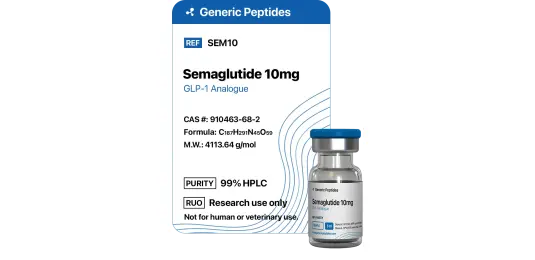
The world of peptides is rapidly evolving, with increasing interest in their potential for weight management and other therapeutic applications. But with the rise of branded medications like Ozempic (semaglutide) and Mounjaro (tirzepatide), and the emergence of generic peptides, many are left wondering: what's the difference?
Branded Peptide Medications: Ozempic and Mounjaro
Ozempic and Mounjaro are FDA-approved medications that utilize peptides to regulate blood sugar and promote weight loss. These medications have undergone rigorous clinical trials, demonstrating their efficacy and safety. However, they come with a significant price tag.
Generic Peptides: Exploring the Landscape
Generic peptides, often sold online or through unregulated channels, offer a potentially lower-cost alternative. However, it's crucial to understand that these generics often lack the same level of regulatory oversight and clinical data as branded medications. It is vital to speak with a medical professional before considering any medication that is not FDA approved.
Key Differences and Considerations
- Manufacturing and Quality Control: Branded medications adhere to strict pharmaceutical standards, while generic peptide quality can vary widely.
- Purity and Potency: Branded medications guarantee purity and potency, while generics may have inconsistent levels of active ingredients.
- Regulatory Status: Ozempic and Mounjaro have FDA approval, while many generic peptides do not.
- Safety and Efficacy: Branded medications have extensive clinical data supporting their safety and efficacy. Generics lack this data.
- Cost Comparison: Generic peptides are typically less expensive than branded medications.
Navigating the Generic Peptide Market
If considering generic peptides, proceed with extreme caution. Consult a healthcare professional and thoroughly research potential suppliers. Be aware of the legal and ethical implications of using unregulated substances. The risk of contaminated or impure products is high.
The Future of Peptides
The field of peptide therapeutics is promising, with ongoing research and development. However, it's crucial to prioritize safety and adhere to regulatory guidelines.
Conclusion: Making Informed Decisions
While generic peptides may seem appealing due to their lower cost, the lack of regulatory oversight and clinical data poses significant risks. Always consult with a healthcare professional before considering any peptide medication, especially those not FDA approved.